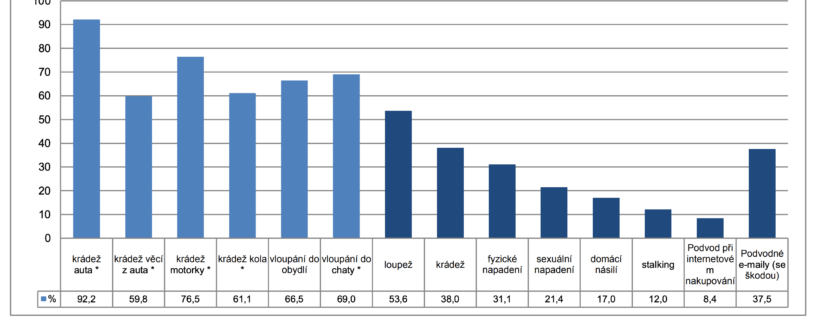Up to two-thirds of criminal complaints are dropped. So what is the correct procedure for filing a criminal complaint, who can file it, and what three things to look out for before doing so? That’s what we look at in our article.
Up to two-thirds of criminal complaints are dropped. So what is the correct procedure for filing a criminal complaint, who can file it, and what three things to look out for before doing so? That’s what we look at in our article.
A criminal complaint is any submission that gives rise to a reasonable suspicion that a crime has been committed. You do not need to specify the specific offence you are making a criminal complaint for (most commonly defamation, fraud or non-payment of maintenance) as the police or prosecutor will judge it by its content and not by its title.
An interesting source in this case is the Ministry of the Interior’s report on the situation of internal security and public order, which maps the reporting of offences to the police. The result is this chart:


You can file a criminal complaint at any department of the Police of the Czech Republic or at the prosecutor’s office. There is no fee, so you do not pay any fees for filing it.
Remember that it is not automatic for the police to tell you how they have dealt with a criminal report. You must ask for this directly in the criminal complaint and you will receive a notification within one month. If you do so, the police must inform you within one month.
Tip: We recommend filing directly with the public prosecutor’s office, which will still order the police to do so, but the criminal complaint will pass internal scrutiny and have a better chance of being heard.
The vast majority of criminal complaints are dropped by the police. That is why it is particularly worthwhile to use the help of solicitors. We will evaluate the adequacy of the filing, draft the criminal complaint and represent you in filing it.
I want to file a criminal complaint
The rules for a criminal complaint are similar to those for any other written submission. Therefore, do not forget to specify to whom it is addressed (in this case, the name of the Police or prosecutor’s office) and who is filing it. There is the option of an anonymous criminal complaint, but this has its disadvantages. This is dealt with below.
In order to demonstrate what the content of the report should be, let’s use a fictitious situation where you file a criminal complaint against a driver who hit your grandmother in a crosswalk.
Counsel advises: How you write a criminal complaint and what evidence you use to support it often determines whether the police or prosecutor will bring a criminal case. If you want to minimize the risk of delay, we can help. We will assess the adequacy, write the criminal complaint and even represent you in filing the complaint if necessary.
We do not recommend that you trust the model criminal complaint forms that you can find on the internet in PDF or Word format. As many as two thirds of criminal complaints are dropped, and this is often because of the form of the criminal complaint. It is therefore better to use an experienced lawyer. At The Affordable Lawyer, an attorney with more than 10 years of experience in criminal law will evaluate your situation and then prepare your criminal complaint.
Nevertheless, we provide you with a template that at least roughly outlines what a proper criminal complaint should look like:
Criminal complaint – hitting a pedestrian with serious bodily injury
Submitter: Jan Novák
Address: Ulice 123, 110 00 Prague 1
Phone: +420 123 456 789
E-mail: jan.novak@email.cz
Submitted on: 12 October 2023
Addressee: Police of the Czech Republic
Regional Police Directorate of the Capital City of Prague
Kongresová 1666, 140 00 Praha 4-Nusle
Description of offence:
On 11 October 2023, at around 14:00, a pedestrian was struck by a car at the crossing from the Bulovka Hospital in the Prague 8 district. At that place and time, an elderly lady (hereinafter referred to as “the victim”) was hit by a driver in a Škoda Fabia car and suffered serious bodily injury as a result of the accident.
Consequence:
The victim was crossing at a green light when a Skoda Fabia vehicle came around a bend at high speed. The victim was unable to react to the fast-moving car, which subsequently hit her. After the collision, the driver of the vehicle drove away from the scene without providing any assistance to the victim.
Consequences of the crime:
The victim was immediately taken to Bulovka Hospital where she was diagnosed with severe fractures and internal injuries that will require long-term hospitalization and rehabilitation. The medical report states that the expected healing period exceeds six months.
Perpetrator Information:
According to witness statements and photographs that were able to be taken, the vehicle has license plate number ABC 1234. The driver is an unknown male in his 30s and 40s.
Victim and witness information:
Victim: Marie Novotná
Address
Phone: +420 987 654 321Witness: Eva Horáčková
Address: Ulice 789, 170 00 Prague 7
Phone: +420 555 666 777
Evidence and other relevant facts:
I enclose photographs showing the perpetrator’s vehicle and draw attention to the presence of a security camera located right next to the crossing, which could provide additional evidence. Please provide the footage from this camera.
You can file a criminal complaint without being the victim or victim of a crime. All that is important for filing is that you have knowledge that a crime has been committed. There are even some cases where you must do so (offences of murder, grievous bodily harm, abuse of a person in your care), otherwise you put yourself at risk of prosecution for not reporting the crime.
Another option is to make an anonymous criminal report. The police still have to deal with it, but it has a considerably complicated situation due to the absence of an important witness and the potential for ambiguities in the submission to be resolved. In the case of an anonymous submission, you have to take into account that you will not know the outcome of the investigation.
There are a few exceptions to reporting a crime. They are exempt:
After the filing, the police begin what is known as an investigation, which involves securing the necessary evidence, leads to a possible crime, and the submission of explanations by the persons under investigation. At this stage, the police authorities are still determining whether a crime may have occurred at all and who the alleged perpetrator may be.
Approximately two-thirds of criminal reports end at this stage, when the police either shelve the complaint or refer it to another authority, for example for misdemeanour or administrative proceedings.
Tip: Want to make sure your filing of a criminal complaint is not in vain? Get an attorney to help you.
In the opposite situation, where the facts suggest that a criminal offence has been committed, a criminal prosecution is initiated. This is initiated by the police or the public prosecutor informing a designated person that he or she is being prosecuted as a defendant for a criminal offence. At that point, the pre-trial procedure is also initiated to investigate all relevant circumstances and to gather evidence, which may include witness interviews or expert reports, for example. At the moment the investigation is completed, the police authority or the public prosecutor may discontinue the prosecution, refer it to another authority as in the previous step, or, failing that, bring an action before the court together with a list of proposed evidence.
Tip: Read when a suspended prosecution is possible.

Remember that the ability to initiate a criminal prosecution is not open-ended. This is because the strength of the evidence available weakens over time and the seriousness of the crime may diminish. The time limits for filing a criminal complaint depend on the seriousness of the offence. Statutes of limitations range in the order of years, for example:
However, the law is thinking of acts that are not covered by the statute of limitations. These include the offence of founding, supporting and promoting a movement aimed at suppressing human rights and freedoms, the offences of subversion of the republic, terrorist attack.
Tip: Whether the offender is a legal or natural person does not affect the limitation period. Only in the case of minors is the period shorter. The criminal liability of juveniles and children also differs. How exactly? You can find out in our article.
In practice, we often see our clients face concerns about the penalty of false accusation before filing a criminal complaint. Therefore, it is important to understand that there is a fundamental difference between a false accusation and the failure to file a criminal complaint. As a whistleblower , you are not responsible for correctly assessing whether a crime actually occurred and who is responsible.
Criminal liability for making a false accusation would only arise when you knowingly lied and the police were subsequently able to prove that you made the false accusation, for example, because of a dispute with the perpetrator you denounce. In such cases, you yourself would be guilty of the offence set out in Section 345 of the Criminal Code, which reads as follows: “Whoever falsely accuses another of a criminal offence shall be liable to imprisonment for up to two years.”
In the above cases, the prison sentence can be increased to up to 8 years.
If you yourself have been the victim of a false accusation, we have written a separate article on how to defend yourself against an attack on your honour.
Learn how the Whistleblower Protection Act protects you in the event your employer engages in illegal activity.
Remember that once you have filed a criminal complaint, it cannot be withdrawn. The prosecutor is required by law to prosecute all crimes of which he or she becomes aware. Therefore, in this case , a plea bargain between the victim and the offender that proposes compensation for damages for withdrawing the criminal complaint is not an option. This practice is quite often encountered. However, it is important to know that such an agreement can only be the basis for a conditional discontinuance of the prosecution or the approval of a settlement.
There are, however, offences that can only be prosecuted by law enforcement authorities if the injured party agrees to it.
A complete list of offences for which consent is required for prosecution can be found in Section 163 of the Code of Criminal Procedure.
We mentioned in the introduction of this article that in most cases a criminal complaint is postponed due to insufficient drafting or lack of necessary evidence. However, in practice, we often see cases where people confuse a criminal complaint with a prosecution. According to the Czech legal system, a criminal complaint is not a procedural means of protecting private or property rights.
Tip: If someone damages your car, it is usually better to sue for compensation than to file a criminal complaint. If you want to file a lawsuit, it’s worthwhile to get the help of an attorney. We will conduct a careful analysis of the case and take care of preparing a pre-suit notice, a lawsuit, an appeal, or straight up representation in court where we will vigorously enforce your rights.
A criminal complaint is a submission on the basis of which the law enforcement authorities may investigate suspicion of a criminal offence, and may be filed by anyone who becomes aware of such conduct, in writing, orally on the record, or electronically, without any fee, at any Police Department of the Czech Republic or at a public prosecutor’s office; the report is judged by its content, not by its name or legal qualification, and therefore it is crucial to provide as specific a description of the act as possible, the place and time of its commission, the possible consequences, the available evidence, the details of the victim, witnesses and possibly the perpetrator, otherwise it risks being delayed already at the stage of investigation, where a significant part of the submission ends; the whistleblower can request to be informed of how the report has been dealt with, and the police or public prosecutor must then inform the whistleblower within one month of the action taken; the filing itself does not automatically lead to a prosecution, but first there is an investigation, after which the case may be dropped, referred to another authority or, conversely, proceed to the prosecution phase; a criminal complaint cannot generally be “withdrawn”, as law enforcement authorities act ex officio, except where the law requires the victim’s consent to prosecution, and the reporting party is not liable if the suspicion is not proved unless he or she has knowingly acted falsely, as the offence is only a false accusation; it is also important to bear in mind the statute of limitations, which varies according to the seriousness of the offence and can be as long as decades, and to be aware that a criminal complaint is not a private claim, but a public interest, so in some situations it may be preferable to opt for a civil action or to consult a lawyer before filing, so that the complaint has a real chance of actually being dealt with by the authorities.
No, the exact legal qualification is not mandatory. Law enforcement authorities judge a criminal complaint by its content, not by what you call it. It is important to be as specific as possible about what happened, when and where it happened, what the consequences were and, if applicable, who should have committed the crime. Incorrectly describing the offence is not in itself a reason to postpone the notification.
If you specifically ask to be informed in the criminal complaint, the police or prosecutor must inform you within one month of how they have dealt with the complaint. Without this request, they are not automatically obliged to inform you and you may not know the outcome of the investigation at all.
Yes, you can file a criminal complaint anonymously and the police must deal with it. However, it should be taken into account that an anonymous submission has less chance of success, as it lacks the possibility of supplementing the information, explaining ambiguities and questioning the informant as a witness. Moreover, you will not know how the anonymous report was handled.
The mere fact that the police drop a criminal complaint does not mean that the complainant has done anything illegal. Criminal liability would only be incurred if the whistleblower knowingly lied and falsely accused someone. If you have acted in good faith and described the facts as you perceived them, there is no penalty.
In most cases, a criminal complaint cannot be “withdrawn” because law enforcement authorities are obliged to prosecute crimes ex officio. The only exception is where the law requires the victim’s consent to prosecution, in which case this consent can be withdrawn under legal conditions. An agreement with the perpetrator on compensation for damages does not usually lead to an automatic dismissal of the proceedings, but may be the basis for, for example, a conditional dismissal of the prosecution or a settlement.
Have you found yourself in a situation that requires filing a criminal complaint? We are here to help. We will reliably protect your rights and handle the entire process for you. We’ll handle everything quickly and flawlessly so you don’t have to worry about a thing.